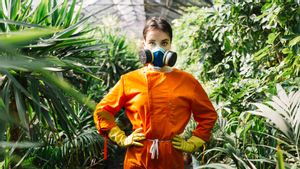JAKARTA - Surgical Oncology (cancer) Specialist at Hermina Bekasi Hospital, dr. M. Yadi Permana asked the public to be aware of the shape and location of moles to prevent the risk of skin cancer.
"For people who have moles, they must pay attention to their location and shape, whether the lesion (lump) is located in a place that is exposed to more sunlight, for example on the face or back of the hand, then the shape also needs to be considered asymmetry or not, and if it is accompanied by itching. immediately consult a doctor to prevent skin cancer, “said dr. Yadi in a discussion with the Indonesian Doctors Association (IDI) reported by ANTARA, Tuesday, August 1.
Yadi explained, if a mole gets bigger, causes color gradations on the surrounding skin, and has irregular borders, then it is very likely that the mole can trigger skin cancer.
"Dermatologists usually recommend that if the lesion is small, just operate immediately, remove it and then examine it under a microscope, because the operation is only minor, local anesthesia is also sufficient if the lesion is one to two centimeters," he said.
"Then don't forget for suspicion of skin cancer, examine pathology and anatomy in the laboratory, the goal is to find out whether this is just an ordinary mole, has pre-cancerous lesions, or has skin cancer itself," he added.
He explained, if a mole bleeds easily and is often accompanied by itching, it is advisable to see a doctor immediately to be treated as soon as possible, the risk of skin cancer is higher.
Cases of skin cancer based on the data submitted by Yadi are not many, where cases of melanoma cancer (attacking the melanocyte cells that give color to our body) are four percent globally.
Meanwhile, non-melanoma cancer (usually due to lumps) is 90 percent, and in Indonesia, based on Globocan data for 2020, the death rate caused by non-melanoma skin cancer is 1.48 percent.
However, even though skin cancer deaths in Indonesia are less than two percent, Yadi still reminds the public to be vigilant, considering that Indonesia is a tropical area with high exposure to ultra violet (UV) rays from the sun which can trigger cancer.
He advised the public to consume foods that contain vitamins C and E and to always wear sunscreen when going outside.
"For skin rejuvenation, it's quite important to consume vitamins C and E, they can be from green vegetables, or direct vitamin E nutrition in the form of soft gel capsules, they can be consumed directly at the recommended dose every day, and if you do a lot of outdoor activities, you must wear maximum sunscreen with SPF 50, and apply it every two to three hours," he said.
The English, Chinese, Japanese, Arabic, and French versions are automatically generated by the AI. So there may still be inaccuracies in translating, please always see Indonesian as our main language. (system supported by DigitalSiber.id)













